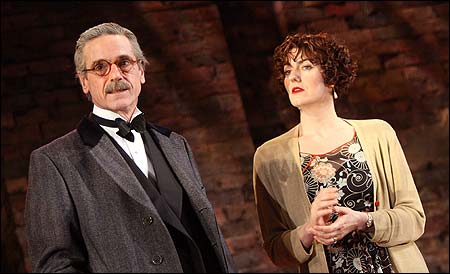Jeremy Irons on Never So Good
Who would have thought it? Howard Brenton, the former
dramatic firebrand of the hard Left, and the man who notoriously brought
simulated anal rape to the stage of the National Theatre in The Romans in
Britain, has written a play that is deeply sympathetic to a Tory prime
minister.
|

|
|
Mixing the intimate and the epic: Jeremy Irons and Anna Chancellor in
Never So Good at the National Theatre
|
The dramatist, who becomes ever more interesting as he
grows older, with fine recent plays about St Paul and Abelard and Heloise to
his name, originally set out to write a satire about Harold Macmillan.
But the more Brenton researched the man once dubbed the
great actor-manager of British politics, the more he came to admire him, and
this gripping, compassionate and often delightfully comic play strikes me as
his finest achievement to date.
There are echoes of earlier works - Coward's Cavalcade,
and Alan Bennett's Forty Years On spring to mind - in a play that follows
Macmillan from his schooldays at Eton to his final years as the stooped and
ancient statesman who accused Margaret Thatcher of selling off the family
silver.
In telling the story of Macmillan this is a play that also
tells the story of Britain in the 20th century, from the courage and carnage
of the battlefields of the Somme to the decadence of the Profumo affair and
the satire of Beyond the Fringe.
Brenton suggests that between them Christine Keeler and
Peter Cook did much to end the ingrained British habit of deference and left
Macmillan himself looking like a man entirely out of tune with modern times.
In the dramatist's view, it was the First World War that
shaped Macmillan. Injured on five different occasions, the horrors of the
trenches left him with a chronic sense of survivor's guilt and an abiding
sympathy for the working class who served their country so bravely.
His one-nation Toryism was viewed as downright socialism
by his pushy American mother who felt her son lacked the last ounce of steel
that would propel him to the top. In this she was mistaken.
In a highly effective conceit, two actors play Macmillan.
Jeremy Irons gives one of the finest performances of his career as the
mature husband and politician, combining charisma with vulnerability, high
principle with low cunning, and political success with personal hurt.
The pain caused by his wife Dorothy's long affair with Bob
Boothby is caught with especially fine and affecting delicacy, but Irons
also captures Macmillan's humour, intelligence and resilience, and by the
end you feel you have seen a complex man in the round.
But the mature Macmillan is constantly shadowed by his own
younger self, the youthful officer who ought to have died in the trenches,
and who constantly questions the older man's motives and actions. In a
difficult role, which often involves little more than watching the older man
in action, Pip Carter helps suggest the inner tensions of Macmillan's
character.
Director Howard Davies seizes all his chances, achieving
many virtuosic moments in a production that mixes the intimate and the epic.
A sedate dance at The Ritz gradually morphs into the battlefields of the
First World War, while the story of the Suez crisis plays out like a
gripping thriller.
Among the supporting performances, Anna Chancellor's
guilt-stricken Dorothy, Robert Glenister's coarse Bob Boothby and Ian
McNeice's wicked impersonation of Churchill shine particularly brightly in a
drama of rare ambition, intelligence and human sympathy.
